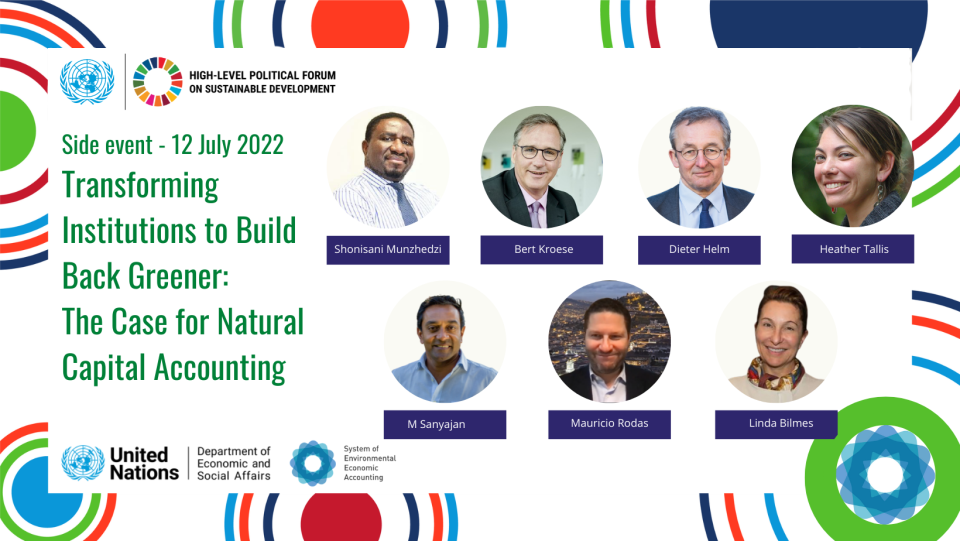Transforming institutions to build back greener: the case for natural capital accounting.

On 12 July, nearly 200 participants joined the side event Transforming Institutions to Build Back Greener: The Case for Natural Capital Accounting, which took place on the margins of the 2022 High-Level Political Forum on Sustainable Development. The event, organized by the UN Committee of Experts on Public Administration (CEPA) and the UN Committee of Experts on Environmental-Economic Accounting (UNCEEA), examined how natural capital accounting (NCA), in particular the System of Environmental-Economic Accounting (SEEA), can help to measure and value natural assets, thereby providing all institutions with a “common denominator” in the effort to urgently address global challenges and to build back greener. The event highlighted how implementation of the SEEA results not only in high-quality, policy-relevant data, but interinstitutional collaboration as well.
The event, moderated by Professor Linda Bilmes (Harvard University), member of CEPA, brought together a wide array of distinguished speakers from different communities, including academia, government and NGOs. Professor Dieter Helm of Oxford University opened the event by emphasizing the urgency of reaching a more sustainable future. However, to reach a more sustainable future, Professor Helm stressed the need for data that capture the state and condition of our natural capital assets:
“The question is: Are we properly protecting and looking after the natural capital assets we’ve got, or are we enhancing them to improve the sustainable return to our economy and society…? The answer is in the natural capital accounts.”
Professor Helm, who previously served as the Independent Chair of the UK Natural Capital Committee, also pointed to the critical role of NCA in supporting UK Government’s 25 Year Environment Plan, which has required a multistakeholder approach.
Bert Kroese, incoming Chief Statistician and Data Officer of the IMF and former chair of the UNCEEA, provided more background on the SEEA for participants and further stressed the role of the SEEA and NCA in fostering multistakeholder approaches and collaboration:
“The SEEA is the common denominator that brings together institutions, producers of data and users of the accounts, and from different areas of expertise.”
Presentations from South Africa and the United States provided real world examples of how the SEEA is improving and harmonizing data collection for better decision making by bringing together different institutions. Shonisani Munzhedzi, Chief Executive Officer of the South African National Biodiversity Institute, presented South Africa’s NCA Strategy, highlighting how the creation of the strategy and implementation of the SEEA have not only led to better data, but unlocked new relationships and partnerships, such as that with Statistics South Africa. In addition, Heather Tallis, Assistant Director at the White House Office of Science and Technology Policy, outlined the multistakeholder plan for the United States’ first set of natural capital accounts. The accounts (tentatively set for release in 2023) will also feed into an upcoming U.S. National Nature Assessment and the formulation of nature-based solutions.
Mauricio Rodas, former Mayor of Quito and CEPA member, highlighted the usefulness of NCA not just at the national level, but the municipal level as well. While ecosystem services are not always associated with urban areas, urban residents benefit greatly from ecosystem services such as air filtration and green/blue spaces. Mr. Rodas said:
“It is critical that urban decision makers understand the full range of benefits that natural assets provide, and much more needs to be done at the city level in order to scale the benefits of this approach [NCA] throughout the world.”
Finally, M. Sanjayan, CEO of Conservation International supported Rodas’ point that NCA needs to be further scaled up.
NCA “really does function as a rosetta stone. It functions as a way to allow different parts of government and the private sector and the citizens to communicate using a common language,” said Sanjayan. Given the potential of NCA, he stressed the need to scale up implementation, citing Conservation International’s recent work on NCA in Peru, Liberia, Botswana and Gabon as examples to scale up.
The UN Department of Economic and Social Affairs closed the event, highlighting the strong collaboration between CEPA and the UNCEEA. Details of the event, presentations and a video recording can be found here.
